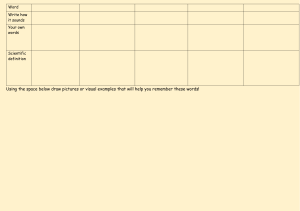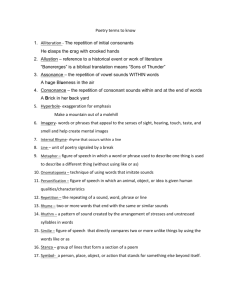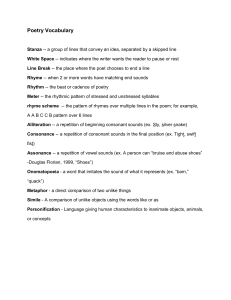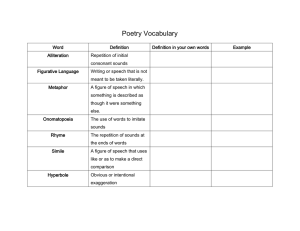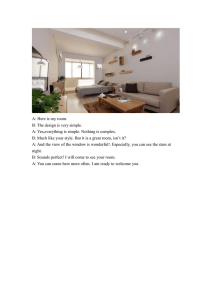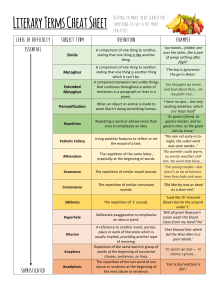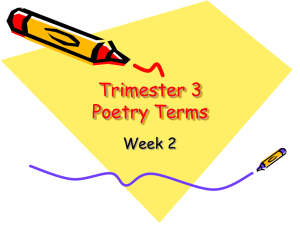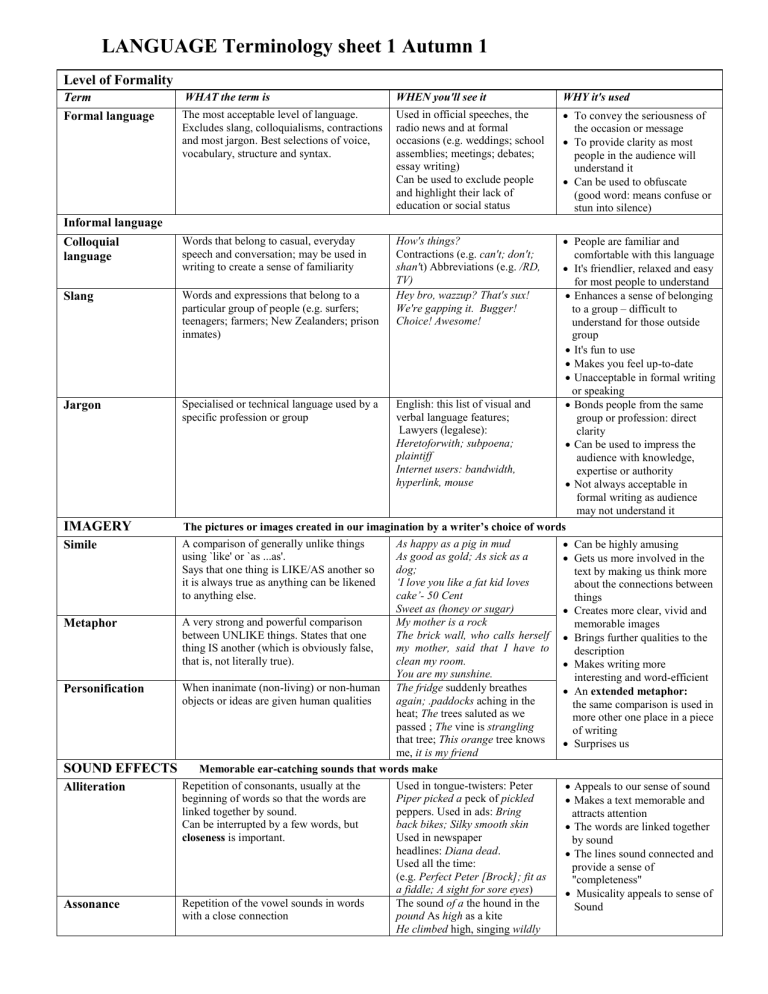
LANGUAGE Terminology sheet 1 Autumn 1 Level of Formality Term Formal language WHAT the term is WHEN you'll see it WHY it's used The most acceptable level of language. Excludes slang, colloquialisms, contractions and most jargon. Best selections of voice, vocabulary, structure and syntax. Used in official speeches, the radio news and at formal occasions (e.g. weddings; school assemblies; meetings; debates; essay writing) Can be used to exclude people and highlight their lack of education or social status To convey the seriousness of the occasion or message To provide clarity as most people in the audience will understand it Can be used to obfuscate (good word: means confuse or stun into silence) Informal language People are familiar and comfortable with this language It's friendlier, relaxed and easy for most people to understand Words and expressions that belong to a Enhances a sense of belonging particular group of people (e.g. surfers; to a group – difficult to teenagers; farmers; New Zealanders; prison understand for those outside inmates) group It's fun to use Makes you feel up-to-date Unacceptable in formal writing or speaking Specialised or technical language used by a English: this list of visual and Bonds people from the same specific profession or group verbal language features; group or profession: direct Lawyers (legalese): clarity Heretoforwith; subpoena; Can be used to impress the plaintiff audience with knowledge, Internet users: bandwidth, expertise or authority hyperlink, mouse Not always acceptable in formal writing as audience may not understand it The pictures or images created in our imagination by a writer’s choice of words A comparison of generally unlike things As happy as a pig in mud Can be highly amusing using `like' or `as ...as'. As good as gold; As sick as a Gets us more involved in the Says that one thing is LIKE/AS another so dog; text by making us think more it is always true as anything can be likened ‘I love you like a fat kid loves about the connections between to anything else. cake’- 50 Cent things Sweet as (honey or sugar) Creates more clear, vivid and A very strong and powerful comparison My mother is a rock memorable images between UNLIKE things. States that one The brick wall, who calls herself Brings further qualities to the thing IS another (which is obviously false, my mother, said that I have to description that is, not literally true). clean my room. Makes writing more You are my sunshine. interesting and word-efficient When inanimate (non-living) or non-human The fridge suddenly breathes An extended metaphor: objects or ideas are given human qualities again; .paddocks aching in the the same comparison is used in heat; The trees saluted as we more other one place in a piece passed ; The vine is strangling of writing that tree; This orange tree knows Surprises us me, it is my friend Memorable ear-catching sounds that words make Words that belong to casual, everyday speech and conversation; may be used in writing to create a sense of familiarity How's things? Contractions (e.g. can't; don't; shan't) Abbreviations (e.g. /RD, TV) Hey bro, wazzup? That's sux! We're gapping it. Bugger! Choice! Awesome! Alliteration Repetition of consonants, usually at the beginning of words so that the words are linked together by sound. Can be interrupted by a few words, but closeness is important. Assonance Repetition of the vowel sounds in words with a close connection Used in tongue-twisters: Peter Piper picked a peck of pickled peppers. Used in ads: Bring back bikes; Silky smooth skin Used in newspaper headlines: Diana dead. Used all the time: (e.g. Perfect Peter [Brock]; fit as a fiddle; A sight for sore eyes) The sound of a the hound in the pound As high as a kite He climbed high, singing wildly Colloquial language Slang Jargon IMAGERY Simile Metaphor Personification SOUND EFFECTS Appeals to our sense of sound Makes a text memorable and attracts attention The words are linked together by sound The lines sound connected and provide a sense of "completeness" Musicality appeals to sense of Sound Rhyme Repetition of sound at the ends of words Some forms of poetry (e.g. ballad; sonnet; limerick) Typical of songs and raps Advertising jingles and slogan Onomatopoeia Where the SOUND of a word is the same as its MEANING. When the sound of the word imitates or suggest the meaning or noise of the action described. Rhythm Selecting specific words to form a pattern of stressed and unstressed syllables Tick tock not only MEANS the sound a clock makes, but it also SOUNDS like the sound a clock makes. (e.g. buzz, meow, bang, bash) Sonnets have 10 syllables in each of the 14 lines. Galloping sound: The Assyrian came down like the wolf to the fold.. Sounds intentionally used to connect to an idea or to imitate what is being described Some letters create a feeling or emotion: d, b, t, give a hard and tough feel; si provides of slippery feel; m and n can have a yummy, warm sound It's a fun! We like to play with words and sounds See reasons listed above It give you a "feel" for a thing A precise, descriptive word Like the "heartbeat" of a text that gives a particular feeling Helps us remember the text INVOLVING THE AUDIENCE Personal pronouns Parts of speech that refer to a person or people I, me, my, ...you, your, ...he, him, she, her...they, them, ...we, us, our Often used in ads and speeches Your contribution can make a difference I, like you understand this; We must ensure that our voice is heard; They are killing machines and they have us fooled into thinking we look after them... Some words evoke positive reactions: dainty, delicate, gorgeous, lovely, free, impressive, visionary Some words create negative associations: The shopping centre was littered with decaying food scraps, ...and sad defeated people Often used by politician and talkback radio hosts Do we want our children using drugs? Do you want to end up dead at 40 for lung cancer? Often disguises imperatives Don't you think it's time you settled down? Abducted by aliens? Call now for compensation. Emotive language Language specifically chosen to evoke an emotional response from the audience. Words used to make the audience feel a certain way. Rhetorical question A question asked, usually in a speech, for which no answer is expected. It is expected that EVERYONE will agree with only one obvious possible answer. Question / Interrogative A question asked where the answer is not obvious. Imperative A direct request or command. Telling your audience to do something. Used in ads: Call now for your no obligation free quote; Push play; Swim between the flags Cliché Overused, dull expression that has lost it's originality and humour through constant use We put our best foot forward; it’s raining cats and dogs; good as gold Sentence types Structural forms – minor / simple / complex… [‘Short’ or ‘long’ sentences are relative] e.g. Minor sentences lack a typical part of a sentence On sale now – running through the corridor to make readers or listeners feel included with the writer or speaker (e.g. us, we and our) and to appear to exclude others (e.g. they and them) To connect to the audience and get them on-side Connects to our feelings to elicit or stimulate an emotional response in the reader Appeals to the audience's emotions about the topic Often used in persuasive writing to manipulate our ideas on a person, issue or situation Ploy to get people thinking about the issue and stimulate a particular response - biased Increases level of drama and interest To connect with the audience and get them on-side Involves the audience by encouraging them to think of answer(s) to the question Persuasive - direction is a command not a request Sense of compulsion May reveal authority Clarity and speed They're easy to understand but boring. Avoid clichés – however, advertisers may use them to connect with audience by creating a sense of familiarity Variety, effect or to draw attention to an important idea. ‘Short’ sentences are simple and direct EMPHASISING IDEAS Term WHAT the term is Hyperbole Exaggeration for effect. Repetition Exactly how it sounds - repeating words, phrases, lines or verses in a text Parallel structure Repeating phrases of similar structure within or over a number of sentences Statistics Give a statistical number or percentage Listing Including many examples adds weight to your argument. Quotations Using a quote from a well-known person to make a point In speeches and writing As Winston Churchill said "Success is the ability to go from one failure to another with no loss of enthusiasm" Anecdote A brief story of an interesting or amusing real life incident that usually happened to the person. Often used in public speaking Positive Comparative / Superlative Degrees of the adjective, and adverb, that indicate the degree of some quality. positive = individual / comparative = pair / superlative of many A repeated, catchy phrase associated with a group, company or product. In conversation to relates to the topic to "That happened to me too..." Stand-up comedian acts are largely anecdotes (e.g. superlative fastest, finest, tallest greatest, most beautiful, the greatest) Slogan WHEN you'll see it Looks a tornado's been through your room I'm so hip even my errors are correct (Nikki Giovanni Egotripping) Advertisers repeat the product name several times In songs and poems e.g. I rise by Maya Angelou In speeches and writing It was cold that night, very, very cold. Education is not just for the young, it is for anyone hungry for knowledge. Education is not just for the rich, it is the right o f every citizen. Education is not just for employment, it is for quality of life. Cats kill over 167.24 million creatures a year in Aotearoa WHY it's used To emphasise a point To stress a major point and make sure the listeners get their message To create a wonderful cadence (rhythm) e.g. Martin Luther King's I had a dream speech Facts and figures to emphasise a point Evidence for an argument To emphasis a point To emphasise a point To evoke the positive reputation, wisdom and authority of the person quoted. To connect with audience To establish common ground People love hearing stories Emphasise the positive Allows a wider comparison of a quality Imperative (e.g. Just do it; Push play;) Alliteration (e.g. Maybe it's Maybelline) Informal language (e.g. Yeah right!) Memorable through repetition Association brings in qualities May exploit the difference in meanings of words which look alike May exploit the difference in meanings of words which sound alike but have different spellings (homophones)Hair today, gone tomorrow "I love picking up after people. It gives my life meaning " says the frazzled mother "What lovely weather we are having!" but its raining outside. Anything to do with the body, sex or death (e.g. down there; hung out to dry instead of suicide – passed away, Used by politicians and corporations e.g. downsizing Usually for humour. Can capture a wider meaning The sun/son of God Ambivalence - not necessarily ambiguity Can be used to retain attention through clever construction and associated meanings Provides humour Highlights what is and what should be Often used in sarcasm to belittle or ridicule People may avoid directly confronting death, sex and bodily functions. Or unpleasant news. It can be more polite, evasive, gentle Used to make ugly actions sound more acceptable Provides colour and links to experience OTHER LANGUAGE FEATURES Pun Irony Euphemism Phrases that play on different meanings of a words giving clever or humorous double meanings. A deliberate confusion of words. The use of words that are clearly the opposite of what is really meant. The opposite of sincerity An expression used to avoid saying something embarrassing or uncomfortable Sensory language Using words that have a strong appeal to one or more of the senses (e.g. Fragrant rhythmic, dazzle, splash, splinter, berry)
